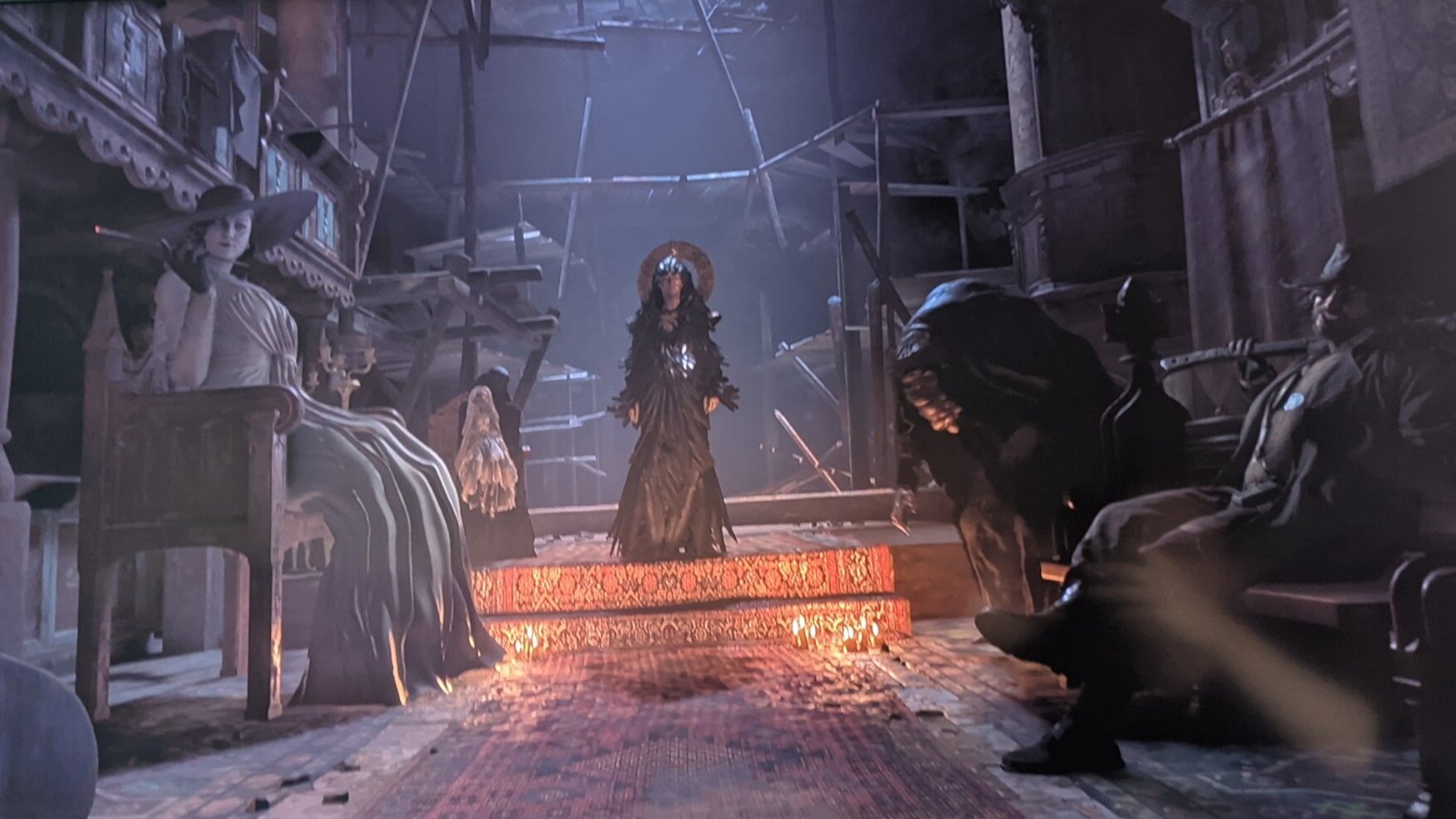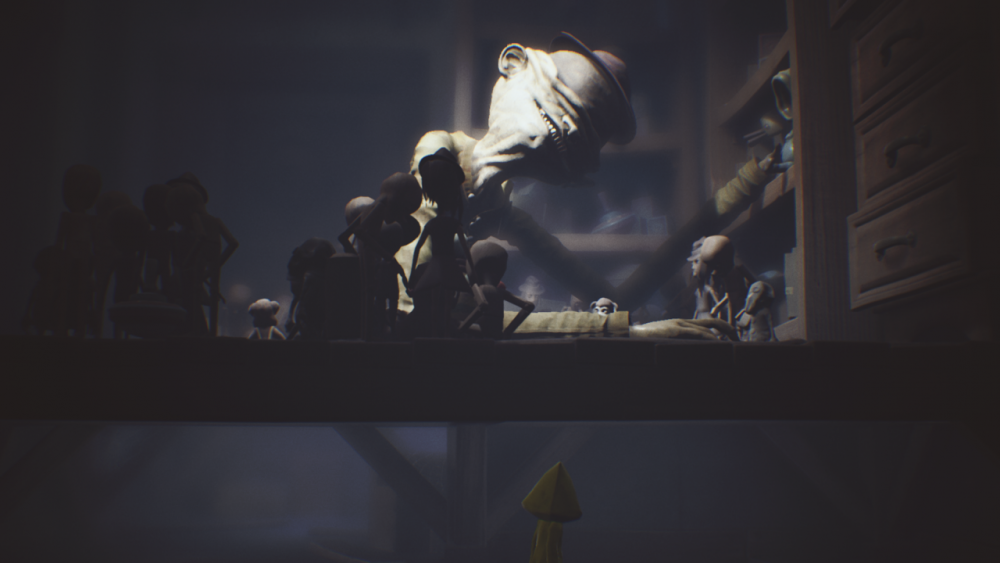In the second Resident Evil VIII gameplay diary we explore the hands-first experience and illustrate the difference between mommy horror and daddy horror.
Read More
In the first Resident Evil VIII game play diary we talk about the role of annihilation in horror stories and the ongoing trauma of Ethan Winters.
Read More
Little Nightmares scares us by turning up the dials on all five of our senses before feeding us to the monsters.
Read More
When I first reviewed Nevermind from Flying Mollusk Studios, I mentioned how I am a bitter, jaded little man, and not given - much - to being startled and scared. The first three scenarios of the game did little to alarm me, which wasn't in of itself the worst issue I've seen in the genre, and by and large it was still an enjoyable experience. The core idea of going inside people's minds is relatively well-worn by this point (with games like Psychonauts) but is given a fresh face with the driving motivation of therapy. Nevermind promises the experience of helping overcome a character's fears as you overcome your own.
I'm pleased to report that with the addition of two new scenarios, Nevermind is really digging down into the promise of its premise, smartly doing away with traditional horror game tropes in favour of examining the everyday, human fears that deeply affect our lives.
**NOTE: FULL SPOILERS WILL FOLLOW THIS POINT**
Read More
I have a lot of respect for independent game artists who are making games out of a sense of love of the genre. Vaclav Hudec. the creator of Blameless, is one of these people. His website biography, as stated, marks him as someone I think I'd get along with. Several of the games he mentions as inspiration - One Late Night, Amnesia, Slender - are games I've talked about on this blog. Clearly Mr. Hudec is a man of great taste.
But more importantly, what intrigues me about Blameless isn't merely that it has taken some of the right lessons from the aforementioned games, but it adds its own unique twist to the mix, deliberately or accidentally.
Read More
If, like me, you grew up on adventure games, you're probably prepared to accept a certain amount of strange logic in your puzzle-playing time. From Guybrush Threepwood using a Rubber Chicken to cross a zipline, to time-traveling in Day of The Tentacle to change the shape of a statue just so it wouldn't provide a handhold for a crazy lady in a wheelie chair, to pretty much everything in King's Quest, Adventure Games have long taught us that logic is a fluid concept pretty dependent on the mood of the designers.
With Goetia, the struggle is in wrapping your head around the often metaphorical or flatly obscure clues that are your breadcrumbs in a plot which, puzzles aside, is well-woven and told.
Read More
Open World survival games are quirky little beasts. The frequency with which they get made in the indie world suggests an appetite for them, which in turn suggests that gamers are more than capable of making their own fun, given the right tools and interface. Yet if we were to look at these games through the lens with which certain "Walking Simulator" type games are scrutinized (is there a fail state? Is there an objective? Is there a driving plot?) we might arrive at the conclusion that they're not "games" in the traditional sense. Unturned, for instance, feels a bit more like a creative tool, a la Minecraft - with zombies.
Read More
"There is an art to the building up of suspense," pronounces Guildenstern, in his first line from Tom Stoppard's absurdist comedy Rosencrantz and Guildenstern Are Dead. It's one of my favourite lines, because suspense is one of those tightrope acts that so often elude game makers and storytellers these days. The nature of narrative arcs often renders a lot of suspense moot: we know that the protagonist isn't going to die, we know that there is some kind of struggle, we know that there will be obstacles, etc. etc. etc.
But there are ways to play on those expectations, to undermine the expected and to arrive at a new, chilling suspense. The House Abandon, from No Code Games, is a brilliant example of this.
Read More
I once heard Unity described as "a very great tool [for building video games], that is very easily abused." I can't think of a game that better epitomizes that sentiment than Void.
Yikes. Hmm, I could probably stop the review right here and just let that stand, but I suppose I should probably go into some more depth and talk about just why this game so colossally disappointed me. Regular readers of our little blog will have detected an excess amount of snark coming off that sentence and may have a sense of impending dread. I rarely bust out the poison pen, but Void just left me in a foul, foul, mood.
Read More
I should preface my opinions of Nevermind, the debut game from Flying Mollusk Studio, with a disclaimer that I have huge respect for passion and innovation. I will always reward trying something new, putting in visible effort, and - perhaps most importantly - not pandering to your audience. So with that in mind, let me start off by saying that designer and team lead Erin Reynold's MFA thesis-turned indie game is definitely a project with a lot of love and effort put into it. It is also, unfortunately, quite flawed. Part of that is due in no small part to what we typically expect from a "horror game," because although it definitely plays into a number of tropes, Nevermind is not a typical horror game.
Read More
Let's get something out of the way: I have never finished Super Meat Boy.
That's something I'm sure a lot of gamers are reluctant to admit, but probably have to. Consistently ranking among the hardest games of all time alongside infamous controller-hurling fodder like Contra or Ghouls n' Ghosts, Super Meat Boy is the 2010 debut game from Team Meat, the aptly-named studio created by designers Edward McMillen and Tommy Refenes.
Read More
As a not-so-closeted über patriot of the Great White North, it was a no-brainer that KONA would come across my radar eventually. The first independent gaming project from Quebec-based studio Parabole, KONA is still in early Access on Steam and GOG, but is powering towards a full release tentatively around September 2016. So at this point, it would be unfair for me to review it, but I do want to say that even in Early Access, this game plays and looks better than hundreds if not thousands of survival horror games in full release on Steam, and is absolutely something you should check out. What I do want to talk, with regards to KONA and the broader picture, is the idea of crowd-sourced horror.
Read More
As someone who grew up on point-and-click adventure games, I am still prepared to admit their flaws. They can be onerous, with puzzles thrown in merely to extend gameplay. They sometimes have too-simplistic or too-complex interfaces. Mostly, though, they rely largely on a player being able to follow the same twisted sense of logic that the designers had when they built the puzzles. In certain situations, like in the Monkey Island series, a lot of this is played very effectively for laughs. Indeed, comedy and the point-and-click adventure seem to go well together, with classics like Day of the Tentacle and Grim Fandango. Horror and point-and-click adventure is a less slam-dunk melding of mediums, and though the mix can produce really surprise hits like The Last Door, often the sheer otherworldly quality of the horror game overwhelms any sense of even remote logic, like in Decay: The Mare.
Read More
When I wrote about Don't Starve about a year ago, it was a game that had boiled the "survival" part of Survival Horror down to a raw essence epitomized by its blunt title. At the time, they had released a large number of updates to the base game, adding cave systems and boss monsters. The game really came into its own with the release of the Reign of Giants DLC, in April 2014. The expansion added new seasons, new biomes, and, best of all, even more boss monsters. This had the effect of making Don't Starve into a more thorough, complete experience, though the core mechanics were essentially the same. The biggest challenge of survival in previous updates - winter - came about a year earlier. Though summer and spring offered some nifty mechanics, they didn't feel all that different.
With the latest major DLC of Shipwrecked, however, Don't Starve is moving into new territories that are offering something that feels like a truly complete experience.
Read More
Repetition builds habits, habits build comfort, and we chose comfort as our baseline reality. Variation reveals that that comfort is an illusion. Chaos rules.
Read More
Imagine, if you will, a land of bright, colourful cheer. It is a place of magical, frolicking creatures. A place of candy, and soft, puffy clouds, and gentle music. It is, both literally and figuratively, a Dream Land.
Yet every light casts a shadow. Every God has a Devil. And even the gentlest, most wondrous of places must have its reckoning.
For Dreamland, that reckoning had a name, spoken only in hushed tones: Kirby.
Read More














